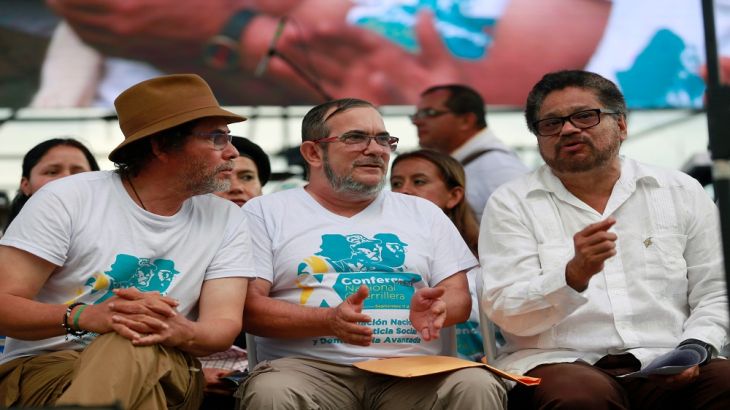Colombia’s FARC rebels ratify historic peace deal
Leftist group declares end to more than five decades of civil war that has killed more than 250,000 people.

Colombia’s FARC rebel group has voted unanimously to approve a peace deal with the government, declaring an end to the five-decade war as it prepares to transition into a new political party.
After four years of negotiations in Havana, the government and the Revolutionary Armed Forces of Colombia reached a final peace accord last month that will end a war that has left a quarter-of-a-million people dead.
Keep reading
list of 4 itemsColombia agrees with ELN rebel group to extend truce
Amid uptick in kidnappings, Colombian family receives ‘biggest gift of all’
Her son was killed by the Colombian military. Now, she’s getting an apology
“Peace is the most beautiful of victories,” rebel leader Rodrigo Londono, who uses the nom de guerre Timochenko, told a crowd of hundreds of FARC fighters on Friday at the close of the group’s congress on the southern Yari Plains.
“We yearn that no Colombians will ever again have to take up arms to make their voices heard and their demands felt, as has been required of us,” Timochenko said to cheers and applause.
|
|
As part of the agreement, FARC will continue to push for social change as a political party, receiving 10 unelected seats in congress until 2026. FARC’s leaders have been coy on policy details but are expected to morph the group into a party rooted in Marxist ideals.
Another congress to officially found the party will be held no later than May 2017, FARC commander Ivan Marquez said at the ceremony.
Two hundred delegates from FARC units around the country gathered at the Yari site, five hours by rutted road from the nearest provincial town, to review the accord and discuss re-organisation in peacetime.
“We inform the country and the government and the governments and people of the world that the rebel delegates of the congress have given unanimous backing to the final accord,” Marquez said.
The peace accord is due to be signed on Monday by President Juan Manuel Santos and Timochenko. Colombians will vote on the deal in an October 2 plebiscite, the final go-ahead for rebels to demobilise. Polls show the accord will easily pass.

But Arlene Tickner from the University Del Rosario told Al Jazeera the first question is whether Colombians will vote in favour of the deal.
“The expectation is that it will pass, but there is huge opposition being led by two ex-presidents … It is quite a profound agreement in terms of the types social, economic, and political changes it proposes, and I think there are certain sectors of the population – mostly conservative sectors – who are fearful of what this means for their interests.”
The congress, the first ever open to media, marks the group’s final meeting as a guerrilla army.
Colombia’s FARC apologises for past kidnappings
Previous congresses, to decide battle strategy, were sometimes held via internet because of military offensives that prevented leaders from meeting.
Although both leadership and rank-and-file fighters say they will prioritise political activism as civilians, the group has so far not provided examples of specific policies.
“Our initial platform is the implementation of the Havana accords,” Pastor Alape, a member of the FARC’s secretariat, told Reuters news agency at the congress. “Our political proposals will have to come from the suggestions of our base.
“We started our political efforts clandestinely and now we aspire, legally, to open our initiatives, together with all sectors of society, to concretely cultivate the political space we are given,” Alape said.
The five-point peace accord covers agricultural reform, an end to the illegal drugs trade, victims’ reparations, FARC political participation and demobilisation.
One mid-level rebel fighter said the group wants to decentralise Colombia’s government, including halving the size of congress, in a bid to combat corruption and ensure communities have control over distribution of royalties from oil and mining projects.
|
|
| Colombia: FARC rebels hold historic final conference |